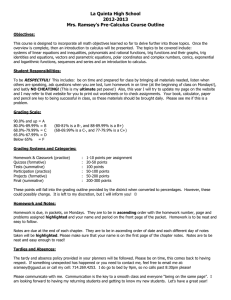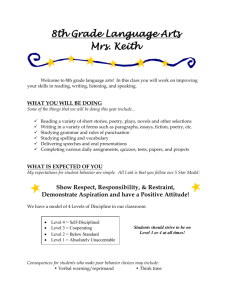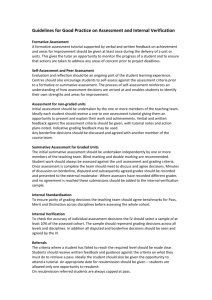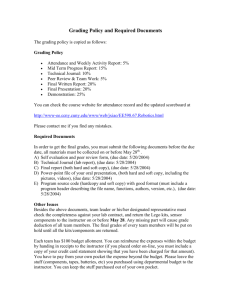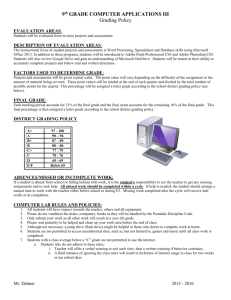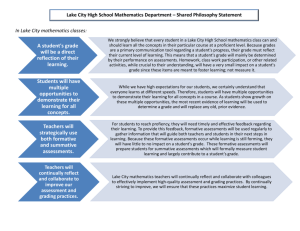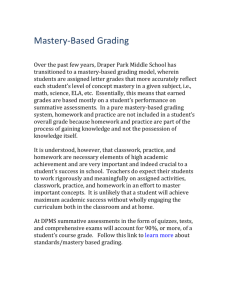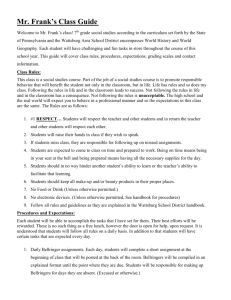Managing Active Learning-Intensive Courses slides
advertisement
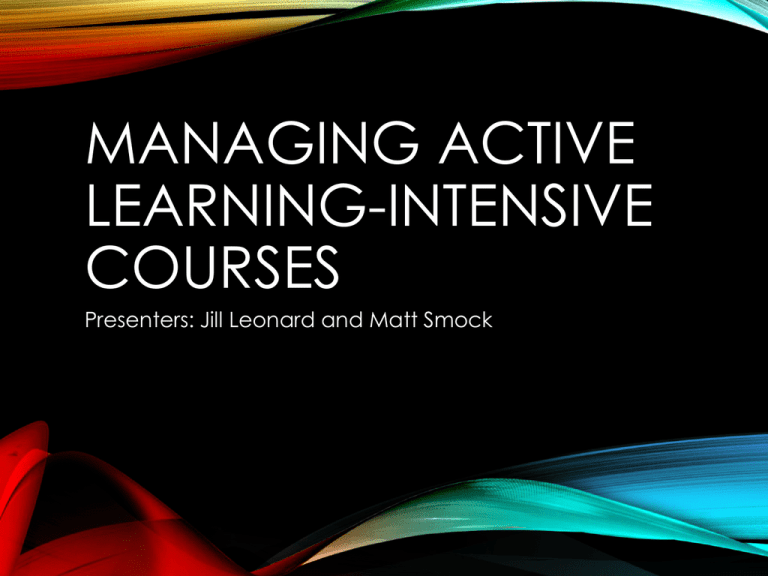
MANAGING ACTIVE LEARNING-INTENSIVE COURSES Presenters: Jill Leonard and Matt Smock OBJECTIVES • Recognize student concerns about the active learning model and set appropriate expectations. • Manage timing of active class sessions. • Describe techniques for forming groups and incorporating and facilitating group activities. STUDENTS AND EXPECTATIONS • New type of experience for the student Come in expecting traditional class experience o TROUBLE if not addressed Explain WHY you are doing this method o BUT not that this is an experiment… Work load expectations may be very different, especially in timing • Students will have expectations of it being different, once you have set that up (i.e. it better be different) • Need consistency and reiteration STUDENT COMMENTS… • “This room would work well with a computer class, but for a Biology class is should be mainly lecture and powerpoints. I think this was overkill” • “I was basically learning from a book, from my peers (who have limited knowledge) and from quick Google searches. I don’t think this was worth my tuition. I prefer traditional classroom styles where I learn from lecture and a professor who can clearly explain the material” • “This class was way too much work. It was not fair to lose points on homework every day” • “The activities in class had nothing to do with the exams and so were a waste of my time” WHAT IS YOUR FIRST DAY EXPLANATION • As a group, develop a list (on the whiteboard) of the pieces to a first day explanation to your students for why you will be teaching your class using active learning (include what you mean by that) What do you need to include? What style of explanation would you recommend • Be ready to report out to the larger group CLASS ORGANIZATION • Modules Start and end of modules • Structure of daily activities (pre-work, activity, postwork) • How will you actually manage the modules Educat? Paperwork? Copies of assignments? Emails? Handling materials • Knowing your students • Nametags • Icebreakers A DAY IN THE COURSE • Start of session ? Prep work accountability Other beginning information • Intro to activity Mini-lecture? Instructions • Student work on activity • Wrap-up Report outs Check for misconceptions and clear understandings • This cycle of intro, activity, wrap-up can take the whole class or can be repeated for smaller activities within a class TIME MANAGEMENT DURING A CLASS SESSION • Estimate how long it would take YOU to do activity…THEN DOUBLE IT! • Have some strategies in mind for going short or long If short o little add-ons If long o places to stop early; o alternative mechanisms for covering “content” (homework?, extend to next session?) o IMPORTANT to avoid skipping wrap-up period • Strategies for identified misunderstandings Mini-lecture Revisit during next session Special homework GROUP WORK • Why might group work be advisable? • What are potential problems with groups? GROUPS • Groups vs individual students • Students need to NEED to be in a group (need each other) • Group size Odds vs evens Numbers Groups in groups • Group membership Self-selected vs instructor selected Random, permanent Random, shifting (daily, weekly, by module, etc.) Instructor selected – structured groups o GPA/grade/pre-test, diversity(?), major, class standing, gender o Permanent vs temporary… GROUPS CONTINUED • Group structuring Formalized (recorder, reporter, advocate, accuracy checker, Devil’s advocate, organizer, etc) Shifting roles and responsibility Groups gone bad o Tossing students out, contracts, peer evaluation/grading • Be mindful of in-class group work vs out-of-class group work • Grading of groups Overall vs individual pieces etc. Materials management (folders, Educat groups, etc.) GROUPS – TAKE HOME MESSAGES • Be thoughtful about your strategy and consider pros/cons What you do in one class may not be the best fit for another • Be consistent with whatever you choose, but it is possible to shift gears • Students need to understand what is going on with groups Have purpose! Communicate! GRADING AND ASSESSMENTS • Formative vs Summative assessment Formative – students (and you) find out what they are learning Summative – instructor evaluates student learning • “grading” of formative materials Grade all vs grade some (why are you grading this?) How to choose what not to grade!? • Flexibility in grading All points known at beginning of semester vs ability to add/subtract assignments on the fly… • Matching assessments Formative to summative Activity to summative SUM UP! • Student expectations Manage them!!! Communicate!!! • Class organization Plan ahead! • Time management Have alternative strategies • Groups Plan them! • Grading and assessments Yes grade! But maybe not everything!

